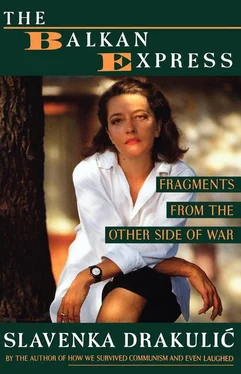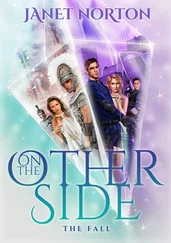Perhaps I don’t understand half of what is going on, but I know that all this is happening because of the fifty or so fools who, instead of having their sick heads seen to, are getting big money and flying around in helicopters. I’m seventeen and I want a real life, I want to go to the cinema, to the beach… to travel freely, to work. I want to telephone my friend in Serbia and ask how he is, but I can’t because all the telephone lines are cut off. I might be young and pathetic-sounding, but I don’t want to get drunk like my older brother who is totally hysterical or to swallow tranquillizers like my sister. It doesn’t lead anywhere. I would like to create something, but now I can’t.
And then he said to the reporter interviewing him something that struck me:
Lucky you, you are a woman, you’ll only have to help the wounded. I will have to fight. Will you come to my funeral?
This is what he said in the early autumn of 1991. I could almost picture him, the street-wise kid from a Zagreb suburb, articulate, smart, probably with an earring and a T-shirt with some funny nonsense on it, hanging out in a bar with a single Coke the entire evening, talking about this or that rock-group. The boy bright enough to understand that he might die and that there is nothing that he could do about it. But we – me, you, that woman reporter – we are women and women don’t get drafted. They get killed, but they are not expected to fight. After all someone has to bury the dead, to mourn and to carry on life and it puts us in a different position in the war. At bottom, war is a man’s game. Perhaps it is much easier to kill if you don’t give birth. But I am reluctant to say what should follow from this: that women don’t participate, or conduct or decide about wars, because they do. Not as women, but as citizens. As citizens they contribute, support, hail, exercise orders, help and work for war – or they protest, boycott, withdraw support, lobby and work against it. This is where our responsibility lies and we cannot be excused.
I am also not excused for what is going on in my country now. Earlier in this letter I mentioned that I felt guilty. Well, my guilt or responsibility, depending on how you define it, is in believing. It is in the political naivety of my generation (even if ’68 taught us how to think politically). We grew up in an already hypocritical atmosphere, not believing in the communist ideology but with the regime still there to be reckoned with. As we couldn’t see the end of it we conformed, believing that it was possible to change it into what we insisted on calling socialism ‘with a human face’. Lucky Hungarians, for they suffered in 1956, lucky Czechs and Slovaks, who suffered in 1968. What happened to us, then? Under only mild repression and with a good standard of living we in Yugoslavia didn’t really suffer.
Recently an American friend asked me how it happened that the most liberal and best-off communist country was the one that now had the war. There are analyses, no doubt, that could give more competent answers to this question. But for me, going back and remembering it all, the answer is so simple that I’m almost ashamed of it: we traded our freedom for Italian shoes. People in the West always tend to forget one key thing about Yugoslavia, that we had something that made us different from the citizens of the Eastern bloc: we had a passport, the possibility to travel. And we had enough surplus money with no opportunity to invest in the economy (which was why everyone who could invested in building weekend houses in the mid-sixties) and no outlet but to exchange it on the black market for hard currency and then go shopping. Yes, shopping to the nearest cities in Austria or Italy. We bought everything – clothes, shoes, cosmetics, sweets, coffee, even fruit and toilet paper. I remember times when my mother who lives in a city only a short drive from Trieste would go there every week to get in stores that she couldn’t get here. Millions and millions of people crossed the border every year just to savour the West and to buy something, perhaps as a mere gesture. But this freedom, a feeling that you are free to go if you want to, was very important to us. It seems to me now to have been a kind of a contract with the regime: we realize you are here forever, we don’t like you at all but we’ll compromise if you let us be, if you don’t press too hard.
We were different then, so we are different now: it is we who have the war. We didn’t build a political underground of people with liberal, democratic values ready to take over the government; not because it was impossible, but on the contrary, because the repression was not hard enough to produce the need for it. If there is any excuse it is in the fact that we were deprived of the sense of future. This was the worst thing that communism did to people. What is our future now? Your future? No one asks that question and I don’t like it. I am afraid this war will last and while there is a war going on even in one part of the country, there is no future. And because I am a typically selfish mother, I don’t want you to be deprived of the future too. Once was enough.
Forgive me for this long, confused and maybe pathetic letter, but I had to write it. Stay well, all my love is with you.
Your Mother
‘Have you seen this before?’ Drazena asked me, holding a yellow piece of paper in her hand, the certificate that she was a refugee from Bosnia and Herzegovina.
‘It took me two weeks to get it. Not because of the red tape – the procedure at the Office for Refugees is very simple even if it takes you half a day waiting in what seems to be an endless queue. But I wasn’t able to pull myself together and go and collect it because I couldn’t accept that I am a refugee, that this time it is happening to me and not to someone else. You see, even now I hesitate to show this certificate to a bus driver when I go into town. In fact, I befriended him just to avoid that, to avoid having to admit that this is my status in the world.’
Drazena is a journalist from Sarajevo who came to Zagreb in mid-April, on the last day when it was possible to leave the city by normal means of transport before the Serbian army surrounded it, the night before they destroyed the bridge over the River Sava to the Croatian side. ‘I didn’t mean to leave the city, I had this crazy idea that nothing could happen to me. To the others, yes, but not to me. But then something happened to make me change my mind,’ she continued.
‘I’d just picked up my daughter Ivana from her kindergarten and as I walked across the street near my house, on the opposite side I noticed this woman. She was ordinary looking, blonde, middle-aged and overweight. She was carrying two plastic bags with some food. It was a late afternoon and I imagined she was heading home from her job in the city. When she was about to cross the street a grenade hit her directly from somewhere above. First she was lifted in the air – for a moment it looked as if she was flying – then she landed at my feet. She lay there motionless with blood coming from what seemed to me like a thousand little holes all over her body. I looked at my daughter. She stood there, with her eyes wide open with horror. She didn’t look at me, she didn’t move or say anything and when I took her in my arms, she was rigid, as if frozen. The next day we left.’
For more than a month Drazena has been staying with mutual friends of ours. In their small two-bedroom apartment they’ve given her and Ivana their child’s room. But she will have to leave soon – perhaps to go to another friend’s apartment. They told me that when Drazena came she expected to go back to Sarajevo within a couple of days, after leaving Ivana with her grandfather on the island of Pag. But two or three days into her stay in Zagreb she heard in a radio broadcast that the building where she lived had been heavily hit by a bomb. For the whole of the week following she just cried and took tranquillizers and nothing could get her out of this terrible state of despair.
Читать дальше












